|
|
|
Sort Order |
|
|
|
Items / Page
|
|
|
|
|
|
|
| Srl | Item |
| 1 |
ID:
164632
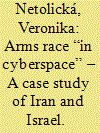

|
|
|
|
|
| Summary/Abstract |
The article focuses on the area of cyber security, specifically on the theory of arms race in cyberspace, which is applied to case study of Iran and Israel. The first part describes the evolution of arms race in conventional environment with link to cyberspace. In the second part, the article focuses on description of selected indicators that prove/disprove the arms race in cyberspace in the relationship between selected dyad. In conclusion, the summary presents not only the selected states but also debates the overall usability of the concept of arms race in cyberspace in its general use for further research.
|
|
|
|
|
|
|
|
|
|
|
|
|
|
|
|
| 2 |
ID:
150183
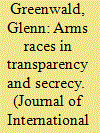

|
|
|
| 3 |
ID:
147380
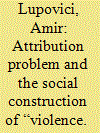

|
|
|
|
|
| Summary/Abstract |
Many scholars suggest that the difficulty of attaining cyber deterrence is due to the intrinsic characteristics of cyberspace. While this article does not aim to entirely refute this assertion, it suggests that the failure to successfully employ cyber deterrence is not determined by the technical challenges of cyberspace, but rather that the effects of these challenges are mediated through social context(s) and norms. To present this, I elaborate on the meaning of cyber deterrence and suggest that a rethinking of this term allows us to better address the various actors involved in the practices of cyber deterrence, as well as to better describe the intersections between the cyber and kinetic means affecting these practices. Building on the concept of cyber deterrence and borrowing from the constructivist approach to International Relations, I focus on how anonymity and “violence” are affected by social constructions and norms and in turn influence the success or failure of cyber deterrence. I briefly illustrate these assertions and their importance with regard to the case of Stuxnet.
|
|
|
|
|
|
|
|
|
|
|
|
|
|
|
|
| 4 |
ID:
160371
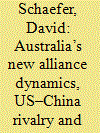

|
|
|
|
|
| Summary/Abstract |
Canberra’s exposure to great-power conflict is arguably more complex and ambiguous than during the Cold War. Drawing from scholarly literature on entrapment and recent developments in outer-space security, this article explores Australia’s position in a hypothetical US–China war over Taiwan. The shifting military balance in outer space, recent war games by the US military and regional trends in defence planning all raise the possibility of a scenario opening with Chinese cyberattacks against information networks shared between Australia and the USA. As a result of its growing dependency on space systems, Australia may be entrapped in a novel way which poses questions for scholars and policymakers. These findings should encourage further study of regional crisis management, with the need for a shared understanding of strategic behaviour in outer space and cybernetworks.
|
|
|
|
|
|
|
|
|
|
|
|
|
|
|
|
| 5 |
ID:
173364
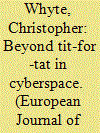

|
|
|
|
|
| Summary/Abstract |
At present, most scholarship on the potential for escalation in cyberspace couches analysis in terms of the technological dynamics of the domain for relative power maneuvering. The result has been a conceptualisation of the logic of operation in cyberspace as one of ‘tit-for-tat’ exchanges motivated by attribution problems and limited opportunity for strategic gain. This article argues that this dominant perspective overlooks alternative notions of how cyber tools are used to influence. This, in turn, has largely led scholars to ignore second-order effects – meaning follow-on effects triggered by a more direct outcome of an initial cyber action – on domestic conditions, institutions, and individual stakeholders. This article uses the case of cyber-enabled political warfare targeting the United States in 2016 to show how escalation can occur as a second-order effect of cyber operations. Specifically, the episode led to a re-evaluation of foreign cyber strategy on the part of American defence thinkers that motivated an offensive shift in doctrine by 2018. The episode also directly affected both the political positions taken by important domestic actors and the attitude of parts of the electorate towards interference, both of which have reinforced the commitment of military planners towards assertive cyber actions.
|
|
|
|
|
|
|
|
|
|
|
|
|
|
|
|
| 6 |
ID:
192077
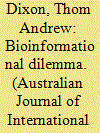

|
|
|
|
|
| Summary/Abstract |
Bioinformational diplomacy is a field of practice that emerges from the politics of biological information exchange during global public health emergencies. Cyberbiosecurity is a field of practice that emerges from the need to secure material at the interface of the digital and biological worlds from misuse and exploitation. Bioinformational diplomacy arises from the intersection of biologically-derived information becoming acutely valuable to national security actors, and the secrecy with which some valuable bioinformation is handled during global public health emergencies. This article analyses bioinformational diplomacy in relation to cyberbiosecurity and shows that both fields of practice are anchored by the concept of bioinformational secrecy. This paper explores the cooperative exchange and competitive exfiltration of bioinformation using the acute phase of the COVID-19 pandemic as a case study. During the COVID-19 pandemic, states sought to protect and covertly acquire certain types of bioinformation. This highlighted a potentially destabilising security dilemma that requires ongoing management via the practice of bioinformational diplomacy.
|
|
|
|
|
|
|
|
|
|
|
|
|
|
|
|
| 7 |
ID:
183163
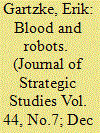

|
|
|
|
|
| Summary/Abstract |
New technologies such as Remotely Piloted Vehicles (RPVs) make it possible to remove human beings from direct involvement in combat. How will this evolving dynamic affect the practice and purposes of political violence? Will conflict become ‘costless’ in human terms as machines replace people on the front lines or will the logic of war continue to call for human sacrifice? While considerable attention has been devoted to the role of technology in transforming warfare, little is known about how new modes of combat will affect established motives for using force. I explore these political dimensions of new modes of conflict, drawing three basic conclusions. First, to the degree that substituting machines for humans lowers the costs for fighting, conflict will become more frequent, but less definitive. Second, in a reversal of previous trends, battlefield automation promises disproportionately to revitalise ground elements of military organisations. Finally, regrettably, new technologies should weaken inhibitions against targeting civilians.
|
|
|
|
|
|
|
|
|
|
|
|
|
|
|
|
| 8 |
ID:
167677
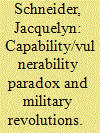

|
|
|
|
|
| Summary/Abstract |
The Information Revolution, or the rise in computing power, allowed states to leverage digital capabilities to exert conventional military dominance. But does it also create vulnerabilities that lead to war? In this piece, I examine the relationship between military revolutions and conflict initiation and identify a capability/vulnerability paradox that suggests the degree of capability dependence created by a military revolution combined with the ability of adversaries to exploit vulnerabilities creates potential pockets of dangerous instability. These indicators suggest that greater centralisation and data dependencies could move the Information Revolution towards incentives for instability.
|
|
|
|
|
|
|
|
|
|
|
|
|
|
|
|
| 9 |
ID:
086786
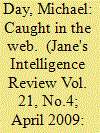

|
|
|
|
|
| Publication |
2009.
|
| Summary/Abstract |
With criminals increasingly turning to cybercrime as relatively lowcost, risk-free source of financial gain, Brazil has become established as one of the its main global centres. Although it is difficult to collect reliable statistics, studies and reports published primarily by commercial anti-virus companies indicate that Brazil has been cybercrime centre for more than decade.
|
|
|
|
|
|
|
|
|
|
|
|
|
|
|
|
| 10 |
ID:
138650
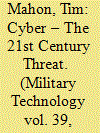

|
|
|
| 11 |
ID:
115448
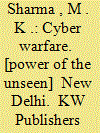

|
|
|
|
|
| Publication |
New Delhi, KW Publishers Pvt. Ltd., 2011.
|
| Description |
xi,245p.
|
| Standard Number |
9789380502748
|
|
|
|
|
|
|
|
|
|
|
|
Copies: C:1/I:0,R:0,Q:0
Circulation
| Accession# | Call# | Current Location | Status | Policy | Location |
| 056844 | 355.343/SHA 056844 | Main | On Shelf | General | |
|
|
|
|
| 12 |
ID:
144729
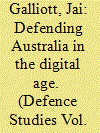

|
|
|
|
|
| Summary/Abstract |
Australian defence strategy is disjointed and incomplete. Some would say that it is non-existent. Either way, this paper argues that Australia’s underwhelming approach to defence is the product of a crippling geographically focused strategic dichotomy, with the armed forces historically having been structured to venture afar as a small part of a large coalition force or, alternatively, to combat small regional threats across land, sea, and air. However, it is argued that Australia can no longer afford to drift between these two settings and must take measures to define a holistic “full spectrum defence” strategy and develop capability to fight effectively and independently across all domains of the twenty-first century-battlespace: land, sea, air, space, and the cyber realm.
|
|
|
|
|
|
|
|
|
|
|
|
|
|
|
|
| 13 |
ID:
186540
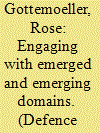

|
|
|
|
|
| Summary/Abstract |
Cyber, space, and emerging technologies have transformed the strategic environment. Since the last publication of the NATO Strategic Concept, the Alliance has responded to this changing environment by addressing emerged and emerging threats at differential rates of operational and policy planning. Now, NATO must seek to holistically integrate these domains into the forthcoming strategic concept to increase the resilience and effectiveness of the Alliance. An adaptable and resilient Alliance that responds to the challenge of cyber, space, and emerging technologies will be best realized through three primary avenues. First, reaching preemptive consensus on actions short-of-force and consensus on space and cyber actions that trigger Article 5 will enhance collective defense and crisis management. Second, communication of capabilities and resolve will promote deterrence and enhance cooperative security among member states. Finally, cooperation with industry partners and among Allies to maintain a cutting technological edge is essential for NATO’s collective defense against emerging threats and enhances cooperative security through a common strategic culture of innovation. It is essential that NATO prevents cyber, space, and emerging technologies from being understood and actioned in isolation, and instead thoughtfully integrates technologies into the Alliances’ key tasks.
|
|
|
|
|
|
|
|
|
|
|
|
|
|
|
|
| 14 |
ID:
188079
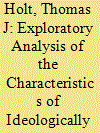

|
|
|
|
|
| Summary/Abstract |
Web defacement is a form of hacking that involves altering the content of a website, resulting in repairs to the website code, loss of revenue, internal loss of productivity, and reputational damage. Limited research has examined the frequency of web defacements, the factors that distinguish them from other hacking motives, and the extent to which the correlates mirror research on physical acts of ideologically-motivated crime. The current study examined over 2.4 million web defacements hosted in the U.S. from 2012 to 2016 to assess aspects of routine activities theory associated with target selection and attack methods among ideologically-motivated defacements. A binary logistic regression analysis revealed that ideologically-motivated defacers were more likely to use unknown vulnerabilities; engage in repeated attacks; target top-level domains linked to foreign nations; domains ending in.edu; and homepages within websites. The findings of this study suggest that the target selection process of ideologically-motivated defacers are more purposive and designed to draw attention to their cause, resembling target preferences of individuals who engage in physical violence in support of an ideological agenda.
|
|
|
|
|
|
|
|
|
|
|
|
|
|
|
|
| 15 |
ID:
166218
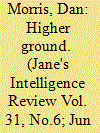

|
|
|
| 16 |
ID:
144748
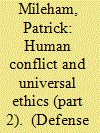

|
|
|
|
|
| Summary/Abstract |
This second part of the review article begins with a definition of military power, when and how it should be used. From a large number of authors, “moral forces” are linked to “codes of conduct”, and the fundamental understandings about the “profession of arms”, based on “fiduciary trust”, “covenanted” service and professional and personal “conscience”. The article covers what authors have written about “culture” and the ethics of “technology” devices and systems, including “cyber” warfare. It concludes with recognition of the increase in ethical sensitivity in this century which is characterized by a phenomenon, the crises of “identity”, personal, national and global.
|
|
|
|
|
|
|
|
|
|
|
|
|
|
|
|
| 17 |
ID:
151355
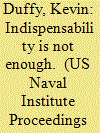

|
|
|
|
|
| Summary/Abstract |
A claim of indispensabilty—even if true—is too abstract to convince citizens and stakeholders of the value of the Coast Guard. The service must tailor its message to each unique beneficiary of its services, from Arctic operations, to cyber, to U.S. power projection.
|
|
|
|
|
|
|
|
|
|
|
|
|
|
|
|
| 18 |
ID:
135525
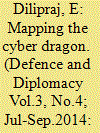

|
|
|
|
|
| Summary/Abstract |
Cyber- widely considered as the fifth domain of warfare- is a conflict ridden domain where actual war is rare case scenario but other forms of conflict are an everyday affair between the challenging players. Now, the question that arises is: what are the other forms of conflict in the cyber domain? The answer to this question in simple words is: since the cyber domain involves players ranging from individuals to nation-states, the various form of conflict in it range from cyber theft, hacking, cyber espionage, data collection through excitation, to cyber sabotage, cyber terrorism, cyber propaganda, cyber warfare etc.
|
|
|
|
|
|
|
|
|
|
|
|
|
|
|
|
| 19 |
ID:
186382
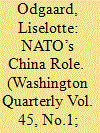

|
|
|
|
|
| Summary/Abstract |
NATO’s vague recognition in 2021 that China constitutes a challenge to the transatlantic alliance reflects an institution that has failed to take on the security threats emanating from Beijing. Russia’s invasion of Ukraine on February 24, 2022 highlights the reasons why this omission is problematic. The war in Ukraine has reignited transatlantic unity of purpose in addressing threats from Moscow toward European security. The existential shock that Europe is facing now that a Russian regime has shown itself willing to go to war against European countries carries with it the risk that China will be forgotten when NATO discusses its future priorities. During the war, China is walking a tightrope between maintaining its commitment to sovereignty and territorial integrity and keeping up cooperation with Russia. The future strength of the Chinese-Russian partnership is likely to be determined by the continued usefulness of Moscow in China’s efforts to carve out more space for a Sinocentric international order based on authoritarian regimes. Meanwhile, China will continue to engender threats to the US and Europe in all domains and across geographical regions.
|
|
|
|
|
|
|
|
|
|
|
|
|
|
|
|
| 20 |
ID:
141208
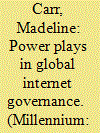

|
|
|
|
|
| Summary/Abstract |
The multi-stakeholder model of global Internet governance has emerged as the dominant approach to navigating the complex set of interests, agendas and implications of our increasing dependence on this technology. Protecting this model of global governance in this context has been referred to by the US and EU as ‘essential’ to the future of the Internet. Bringing together actors from the private sector, the public sector and also civil society, multi-stakeholder Internet governance is not only regarded by many as the best way to organise around this particular issue, it is also held up as a potential template for the management of other ‘post-state’ issues. However, as a consequence of its normative aspirations to representation and power sharing, the multi-stakeholder approach to global Internet governance has received little critical attention. This paper examines the issues of legitimacy and accountability with regard to the ‘rule-makers’ and ‘rule-takers’ in this model and finds that it can also function as a mechanism for the reinforcement of existing power dynamics.
|
|
|
|
|
|
|
|
|
|
|
|
|
|
|
|
|
|
|
|
|